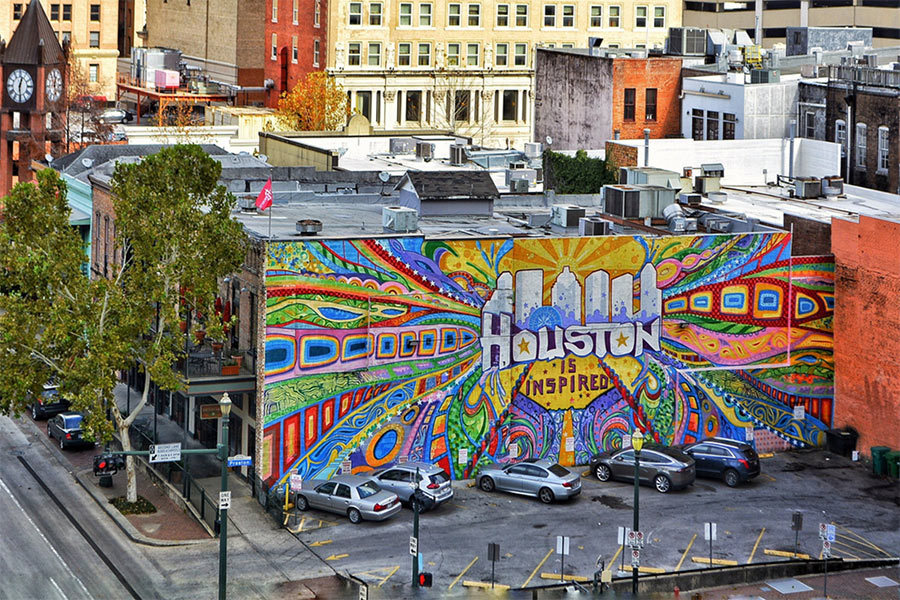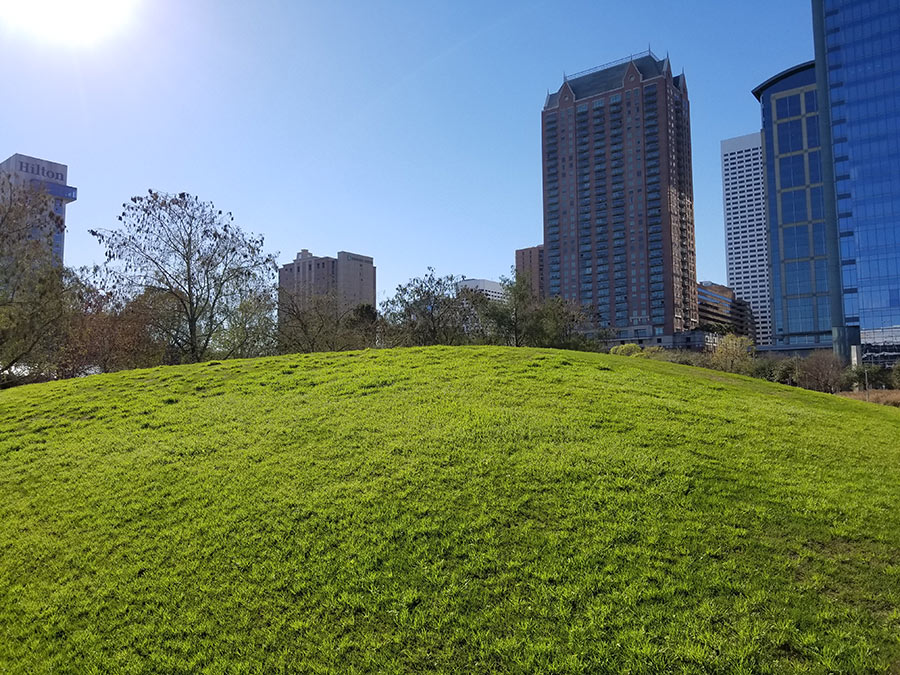
- Commercial Building Permits in Houston $400M Behind Pace Set Last Year from January to April [HBJ]
- Carson Cos. Starts Third Phase of Bayport Industrial Park, Adding 397,775 SF Across 4 Buildings [Houston Chronicle]
- Dow Chemical Latest Tenant for Clay Development’s Deerwood Office III Office Building in Deer Park [Realty News Report]
- The Market at Springwoods Village Now 80% Leased After Signing Torchy’s Tacos, Chick-fil-A, MOD Pizza [Houston Chronicle]
- This $13M River Oaks Unit Might Be the Most Expensive Penthouse Ever Listed for Sale in Houston [Houston Chronicle]
- Sneak Peek Inside The Grand at LaCenterra, the First Midrise Apartment in Katy [HBJ]
- Elon Musk-Chaired Solar Power Installation Company SolarCity Expanding to Houston Market [HBJ]
- How Houston Stacks Up On Transit Equity [The Urban Edge]
- New Houston Bike Plan Expected To Go Before City Council for Adoption in August or September [Houston Public Media]
- Houston Has the Qualities Millennials Want in a City But Fewer Than 1% Want To Live Here, Finds Abodo Study [Houston Chronicle]
Photo of the San Jacinto Monument: Russell Hancock via Swamplot Flickr Pool
Headlines





Re: low solar power market penetration: It’s not simply that people shop around for energy or that energy is cheap here. Many places in the country with high solar buy-in have HUGE incentives for homeowners to do so. Both my parents and my sister (east coasters, different states) have had solar panels installed for NO COST by the solar company because a) the company is looking to break into the market and more importantly b) the state government provides such rich tax incentives that the solar companies can do all the installation, make guarantees regarding roof integrity, hook you into the power grid, etc. and still come out on top. No matter the situation, there is no free lunch–someone pays. Either the company or the state (and therefore the residents, albeit indirectly). Now, would I like free panels and a negligent electricity bill? Sure. Is that going to happen in Houston anytime soon? No.
Re: Millenials. This is no different than all generations. You don’t choose Houston. Houstom chooses you.
Abodo = a website with apartment listings
Adobo = a dish usually consisting of meats/seafood deliciously marinated in vinegar and seasonings
I would be more interested in a survey that studies what millenials want in adobo, actually.
Oops! Thanks for catching that, slugline!
Commenter7: I completely agree. If I could find a job that matched cost of living in another city, such as NYC or San Fran, I would be on the next flight out.
However, I would never move to Austin over Houston. Maybe I’m alone but I haven’t sipped the kool aid on Austin. Houston has everything 10 fold. We simply have the population advantage. As far as the creative class goes, Austin does have the commercial edge. Unless you live Downtown, you’re not walking everywhere.
It’s like people who live in Austin are classmates that want to get away from their parents in a just different enough setting. Generalizing, again.
Re: Millenials… Houston is never going to be able to compete when it comes to the “what is your dream city†game, no matter how many boxes it checks for jobs, affordability, walkability, etc. Houston is a great city, with lots of diversity and culture. But it boils down to geography. If you look at the top 10 cities on that millennial preferred list, only one doesn’t fall on a coast line or at the base of a mountain. Austin is the exception, its position on the list most likely secured by the South by Southwest scene (though really, even Austin has the hill country). When you ask young people what they need to live well in a struggling economy, then yes, the checked affordability/walkability boxes are important. But as soon as you ask what cities are the most “desirableâ€, that’s a whole different question. The word desirable conjures the dream cities with the famous bridges, the waterfront parks & beaches, the scenic mountains framing the city skyscape… essentially the post-card worthy places you picture yourself living if you could choose anywhere, no strings attached (and by nature of being young-er, millennials generally have less strings). Houston was built in-land, on a giant, swampy flood plane. Its skyline is wide, flat and smoggy. There’s nothing sexy about that. And despite being one of those millennials who moved here against my ‘desires’ yet came to genuinely love the city (including all the things on the ‘need’ checklist) – I would move in a heartbeat to a post-card worthy city with most of the same amenities, if I wasn’t tied to Houston for my job.
@Otter
This is basically true but it should be noted that that mindset is mainly limited to self-indulgent, white millenials. Has anyone pointed out that all these “post-card” cities typically don’t have much of an immigrant or black population? Hmmmmm………..
@Otter
Agree 100%. I fall into the Millenial demographic (by the skin of my teeth!) and would not have ever though to pick Houston as my landing spot just coming out of school 11 years ago. I definitely love living here now, but that’s the beauty of economics… if you go to where the opportunities/jobs are and keep an open mind, quality of life can surpass living in a postcard city. It may not be glamorous, but people here also tend to not have the NYC/SF/Seattle attitude, either.
I think if you ask minority populations the same question they’ll come up with a nearly identical list. All the cities with younger populations group towards the top of the list and cities with older populations can be found at the bottom, with the exception of the sunbelt cities that folks tend to avoid due to lack of investment in infrastructure and cultural amenities.
.
If any of them do have low minority populations it’s probably more a representation of the fact that we have low social mobility in this country and in demand cities with access to better opportunities and wages already require big incomes or small fortunes in order to buy into the game.
.
I think it’s an accurate reflection of Houston too. We may have a more youthful population than most every city on this list, but it’s too diversified, spread out and with lower incomes then you’ll find in these other cities with larger cultural pull. Being a college town helps climb list like this real quickly.
.
I think we can all agree the cities it’s hardest to raise a family or build wealth in are all clustered at the top with more hosptiable cities for families towards the bottom.
@Joel
I don’t know what you mean exactly by “minority” populations but if you ask blacks and immigrants (immigrants mainly from developing nations) you will certainly/absolutely not get the same list as what you’d get from white millenials, or anything resembling it. Both sets of groups will give differents reasons for not wanting to live at those cities on the top of the list; blacks will likely give social reasons and immigrants will likely give economic reasons. Those people are moving to Houston, LA, Miami, Chicago, Philadelphia and everywhere in between–> economically/racially diverse, WORKING class cities. Not self-important cities with awesome biking trails and coffee shops. Am I suggesting that this attribute (lack of blacks and minorities) is a significant component of (white) millenials’ draw to post-card cities? Yes.
Good points being made here. Otter brings up Houston’s lack of scenic mountains or a coastline (Galveston doesn’t count – it’s not actually Houston). Joel and Protagoras seem to disagree but I would argue they don’t. Everybody wants cities with relatively low crime, lots of job opportunities, and a reasonably affordable cost of living, as Joel points out. Beyond that, people disagree, as Protagoras points out.
@Protagoras
Without subscribing too much to the “self-indulgent millennial†trope, you’re probably right in that this particular surveyed population may have skewed towards a white demographic, whose privilege allows them more social and geographic mobility. However. Many of these cities are going to be at the top of the list no matter which way you slice your demographic cross-section, because they are large enough and/or popular enough to cater to all ethnicities and backgrounds. I’ll concede that places like SanFran are only a realistic option for those who can afford it (or had the means to educate themselves enough to afford it). But to be clear, SanFran is not devoid of black people. Nor of immigrants, especially asian-immigrants. And its well-preserved historical architecture, the Golden Gate bridge, and west coast location are always going to give it an edge over somewhere like Houston, regardless of affordability.
It is short-sighted to say that qualities like nice scenery, access to parks and waterfront, and ‘awesome bike trails and coffee shops’ are only sought after by white millenials. It’s also quite a leap to say that white millenials are specifically targeting less diverse cities because POC ick them out. I think, if anything, it points to the fact that these post-card towns have become so sought after, that their overcrowding/limited housing has driven up the cost of living to the point that those economically limited groups (ie most ethnic minorities) can no longer afford to live there, due to a whole slew of other institutional problems that this post isn’t supposed to be about, and as a side effect, has limited diversity and lead to the white-washing of the US’s most desirable cities.
Seems to me that it may also have to do with the climate. I note that many of the cities at the bottom of the list are very hot and humid during the summer. And a few of them are also very cold and snowy during the winter.
@Otter
You might want to look more closely at the numbers of SF’s black population which is well below the national average and has dramatically fallen (halved in fact) over the last 30-40 years. SF black population is 6% (same as Portland) compared to Houston’s 25%. And if you think that the lack of blacks wanting to (and actually) moving to places like Portland, Denver and Austin are based on economics/affordability then please explain the more recent migration patterns of blacks moving from the north to the south over the few couple of decades; there was no migration to Portland even when Portland was not what it is today and when it was affordable. I still firmly believe that these post-card cities exist in the way they do only to satisfy the needs of white (mainly millenials) for largely superficial reasoning and because, yes, black people ick them out even if they aren’t fully conscious or aware of it. Phony liberals are what they are.
Otter communicates clearly; totally agree. Also, what’s up with trying to inject a racial element into Otter’s analysis? Any race is going to tell you that the Bay Area is more physically beautiful than the Houston-Woodlands-Sugar Land metro area. It’s not a racial thing; it’s a human being thing that’s more foundational than race–we have eyes and a brain w/ a bunch of subconscious processes that tell us what’s physically appealing without needing too much conscious thought. When you eat chocolate cake, do you say, “Oh, I don’t know if this is tasty; let me contemplate on that for a few minutes” or DO YOU JUST KNOW it’s tasty cuz you’re a human being with a tongue that has taste buds on it? When you see the Pacific mist rolling past enormous redwood trees; when you see the spray break on the rocks and it smells fresh–that’s beauty we all get at the deepest level.
Blacks have long been getting priced out; Latinos have long been getting priced out. Gentrification happened/ing: definitely Mission District, kind of Tenderloin. If you want to be prideful, like it was your choice on not living in SF, you could say, “I’m black/Latino/Welsh (Welsh joined Gold Rush) and I don’t want to live in SF b/c there aren’t a lot of blacks/Latinos/Welsh there.” Or you could tell the whole story: that it never was your choice–SF priced me out and took the choice from me long ago: “I’m black/Latino/Welsh and I don’t want to live in SF b/c there aren’t a lot of blacks/Latinos/Welsh there–because long-timers were priced out and newbies like me can’t price in.” I lived in the Bay Area over a decade ago, and know I can’t afford to live there again–it’s not my choice. However, Houston is still in my range of choices, and I love her for it… Houston ya sticky, embracing, accepting, open-armed, sweet bulbous octopus that takes me in when hard-edged, elite-or-die SF kicks me out. I’ll never forget who was there for me when I was hurting: Houston.
The Chronicle article says, “fewer than 1 percent of [millenials] ranked Houston as a desirable place to live”, but the Abodo survey methodology revealed only people’s favorite city. Having a favorite city is mutually exclusive to all other cities, but feeling that a city is desirable is not. You’d expect responses to get bunched-up onto a few cities, but that doesn’t mean what the Chronicle thinks it means.
Then, when you go to the Abodo survey results that rank various factors based on importance and the age of the respondent, a “thriving job market”, “affordable rent”, and affordable houses” totally sweep the top categories. “Parks or hiking trails” are a pretty consistent #4. I would assume that this is also a ranking based upon responses about which factor is the most important.
However, then, rather than use that data to weight the various factors that are used to determine Abodo’s “Favorite Millenial Cities”, they look at 10 factors and each are weighted equally. Whether a city scores for a factor or not is binary and seemingly arbitrary, so Houston scores 1 for “jobs market” but so does Columbus, OH. Houston scores 1 for “affordable rent”, but so does Washington DC. Houston scores 1 for “affordable homes”, but so does NYC. And even though “walkability” was ranked as #8 or #9 in the top ten most important factors and being “LBTBQ-friendly” was barely on the list, but each still gets a 10% weight, the same as “jobs market”. Houston scores 0 for “walkability” and “LGTBQ-friendly”, and whether or not that is well-deserved, these factors simply aren’t as important as the others but are weighted equally.
The methodology is shit. Although interesting, the survey does not reveal information that is very useful aside from what is obvious: people will move to a thriving and affordable city.
@ThanksHouston
You speak as though beautiful surroundings are the only thing that matters here. Some people do not give a s&!t about the mountaintop mists, cool ocean breezes, bridges or redwoods. Whether those people can afford to live in that kind of place or not is just coincidental. However those willing to pack up and move from wherever they are from in order to immerse themselves in those kind of environmental superficialities are largely white egocentric millenials who praise the idea of diversity while going to great efforts to live in a very homogenously white city. This is a fact. Interpret it however you want.